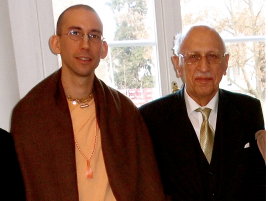Swiss Devotee and Sufi Teacher Invited to an Interfaith Dialogue
By Contributor | Дек 03, 2011

Recently, Krishna-premarupa Dasa, a young monk and priest who heads the ISKCON Temple in Zurich, Switzerland, was a weekend guest at the World Monastery in Radolfzell, Germany. This was the third time he was invited to the monastery. This time he was invited to be part of an evening dialogue featuring himself with eighty-six-year-old Shaikh-ul-Mashaik Mahmud Khan, the President of the International Sufi Movement in The Hague. Mr. Khan travels worldwide to discuss Sufi meditation. There were thirty five other scholars and religionists in attendence.
Chairing the dialogue was Alexandra Mann, MA, a religious scholar from Frankfurt and the chairwoman of the World Monastery. The World Monastery had also sponsored two previous dialogues between Krishna-premarupa and a Tibetan monk. Krishna-premarupa’s guru, the late Srila Bhaktiswarupa Damodara Swami, from Manipur, India, took part in many religious and cultural dialogues. He also organized two international symposiums on science and religion in India that drew the participation of several Nobel laureates.
Mrs. Mann asked both the Sufi and Krishna participants questions about the evening’s theme: “Meditation is the end of concentration.” They discussed their practices and the importance of music. For a Sufi, music is the voice of the soul. For a devotee of Krishna, the sound of a mantra is the essence, and music is a means to get to it.
Classical Sufi scholars define Sufism as “a science whose objective is the reparation of the heart and turning it away from all else but God, and classical Sufis were characterised by their attachment to a practice of repeating the names of God,” according to Wikipedia. Chanting the holy names of God in the Hare Krishna mantra characterizes devotees of Krishna.
Repeating Srila Prabhupada’s teachings, Krishna-premarupa made a favorable impression on the scholars present and other audience members.
“Its my experience that Srila Prabhupada’s wisdom and mercy extends itself through his teachings,” said Krishna-premarupa. “Knowing this,” he said, “although I am decades younger than my Sufi colleague, helped me feel confident in sharing the Vaishnava message.”
The Monastery World “trusts the peacekeeping force of dialogue between religions and cultures on the inner level of shared experience.” Weltkloster, or World Monastery, is housed in a building that once formed part of historic monastery. A few Christian nuns still live there, including one nun from India. She wears saris and offers a ghee lamp while singing the first line of the Gayatri mantra as part of her spiritual practice. The building itself has a prayer hall in the cellar and a meditation hall on the roof. Followers of different traditions often come there to talk, meditate, cook, and take meals together.















